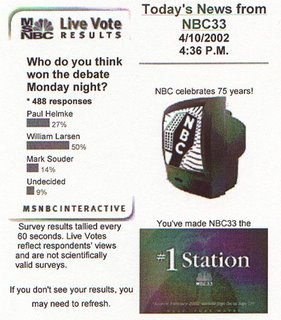Investing Social Security Funds.
Personal accounts are in the news these days. Many say they are the solution while others say they will worsen Social Security’s problem. What is the truth and how do you determine for yourselves?
Social Security earned 5.7% on its trust fund in 2004. It is not that Social Security’s trust fund earns a low rate of return, but rather Social Security will pay a low rate of return to future beneficiaries due to the high tax rate paid for their benefit. www.ssa.gov/OACT/ProgData/effectiveRates.html
At www.nationalcenter.org/gspan.htm you can see Alan Greenspan remarks of December 6, 1996 on investing a portion of social security funds into equities.
“If social security trust funds are shifted in part, or in whole, from U.S. Treasury securities to Personal debt and equity instruments, holders of those securities in the Personal sector must be induced to exchange them, net, for U.S. Treasuries. If, for example, social security funds were invested wholly in equities, presumably they would have to be purchased from the major holders of such equities. Personal pension and insurance funds, among other holders of equities, presumably would have to swap equities for Treasuries. But, if the social security trust funds achieved a higher rate of return investing in equities than in lower yielding U.S. Treasuries, Personal sector incomes generated by their asset portfolios, including retirement funds, would fall by the same amount, potentially jeopardizing their financial condition. This zero-sum result occurs because of the assumption that no new productive saving and investment has been induced by this portfolio reallocation process.
Thus, the dilemma for the social security trust funds is that a shift to equity investments without an increase in domestic savings may not appreciably increase the rate of return of social security trust fund assets, and to whatever extent that it does, would likely be mirrored by a comparable decline in the incomes of Personal pension and retirement funds.”
Proposals call for changing the benefit formula from wage indexing to inflation indexing. You can read about this at www.ssa.gov/OACT/COLA/Benefits.html This reduces the initial benefit by about 25%. Had this change taken place in 1983, benefits would be 19% less for those retiring this year. Increasing the number of working years used in the calculation from 35 to 40 would reduce the average indexed wage, resulting in another 5% benefit cut.
In addition, for every dollar diverted to a personal account, the worker will be charged a finance rate equal to the long-term bond rate plus 1%. In effect Social Security would make 1% on the balance of your account yearly. This “loan” would be repaid when you retired by reducing your already reduced benefit by its equivalent annuity value. This is referred to as the “OFFSET” condition. Diverting about 4% would reduce your Social Security benefit to zero. You can read about this at www.csss.gov/reports/Final_report.pdf, page 99
In addition any money borrowed to pay transition costs will have to be financed, which would raise your federal income taxes. You will earn a higher rate of return on your diverted dollars, but will now have a sizable loss on your non diverted dollars for a combined return close to zero percent.
On average, proposed Personal accounts when combined with the Social Security benefit will provide no more than the current payable benefit. Personal Accounts do not increase overall savings, but simply is an accounting gimmick. Real savings can only begin with real benefit cuts now.
In simple terms you cannot get something from nothing. If you are not happy with the current Social Security program, then you should be equally upset with Personal accounts.
What Went Wrong With Social Security?
The Larsen Plan



2 Comments:
Mr. Larsen, I would like to link your blog to my page. Any objections?
Please feel free to link my blog.
Post a Comment
<< Home